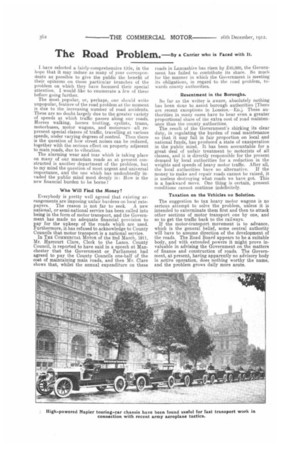The Road Problem.—BY a Carrier who is Faced with It.
Page 6

If you've noticed an error in this article please click here to report it so we can fix it.
I have selected a tairly-comprehensive title, in the hope that it may induce as many of your correspondents as possible to give the public the benefit of their opinions on those particular branches of the problem on which they have focussed their special attention. I would like to enumerate a few of these before going further. The most popular, or, perhaps, one should write unpopular, feature of the road problem at the moment is due to the increasing number of road accidents. These are no doubt largely due to the greater variety or speeds at which traffic passes along our roads. Horses walking, horses trotting, cyclists, trams, motorbuses, motor wagons, and motorcars—all. represent special classes of traffic, travelling at various speeds, under varying degrees of control. Then there is the question of how street noises can be reduced, together with the serious effect on property adjacent to main roads, due to vibration. The alarming wear and tear which 18 taking place on many of our macadam roads as at present constructed is another department of the problem, but to my mind the question of most urgent and universal importance, and the one which has undoubtedly invaded the public mind most deeply is: How is the new financial burden to. be barriel Who Will Find the Money? Who Will Find the Money? Everybody is pretty well agreeel that existing arrangements are imposing unfair burdens on local ratepayers. The reason is not far to seek. A new national, or semi-national service has been called into being in the form of motor transport, and the Government has made no adequate financial provision to pay for the upkeep of the roads which are used. Furthermore, it has refused to acknowledge to County Councils that motor transport is a national service. In THE COMMERCIAL MOTOR of the 2nd March, 1911, Mr. Harcourt Clare, Clerk to the Lancs. County Council, is reported to have said in a speech at Manchester that the Government or Parliament had agreed to pay the County Councils one-half of the cost of maintaining main roads, and then Mr. Clare shows that, whilst the annual expenditure on these roadsin Lancashire has risen by £40,000, the Govern ent has failed d to contribute its share. So much foe the manner in which the Government is meeting its obligations, in regard to the road problem, towards county authorities.
Resentment in the Boroughs. So far as the writer is aware, absolutely nothing has been done to assist borough authorities [There are recent exceptions in London.---Ku.]. These authorities in many oases have to bear even a greater proportional share of the extra cost of road maintenance than the county authorities. The result of the Government's shirking its clear duty, in regulating the burden of road maintenance so that it may fall in fair proportion on local and national funds, has produced a state of exasperation in the public mind. It has been accounta,ble for a great deal of unfair treatment to motorists of all classes, and it is directly responsible for the present demand by local authorities for a reduction in the weights and speeds of heavy motor traffic. After all, the local authorities have no alternative. If the money to make and repair roads cannot be raised, it is useless destroying what roads we have got. This is a backward move. One thing is certain, present conditions canuot continue indefinitely.
Taxation on the Vehicles no Solution.
s y
The suggestion to tax heavy motor wagons is no m, unless it is serious attempt to solve the problem, intended to exterminate them first and then to attack other sections of motor transport one by one, and so to get the traffic back to the railways.
o o
If the motor-transport movement is to advance, which is the general belief, some central authority will have to assume direction of the development of the roads. The Itoad Board appears to be a suitable body, and with extended powers it might prove invaluable in advising the Government on the matters of finance and construction of roads. The Government, at present, having apparently no advisory body in active operation, does nothing worthy the name, and the problem grows daily more acute.




















